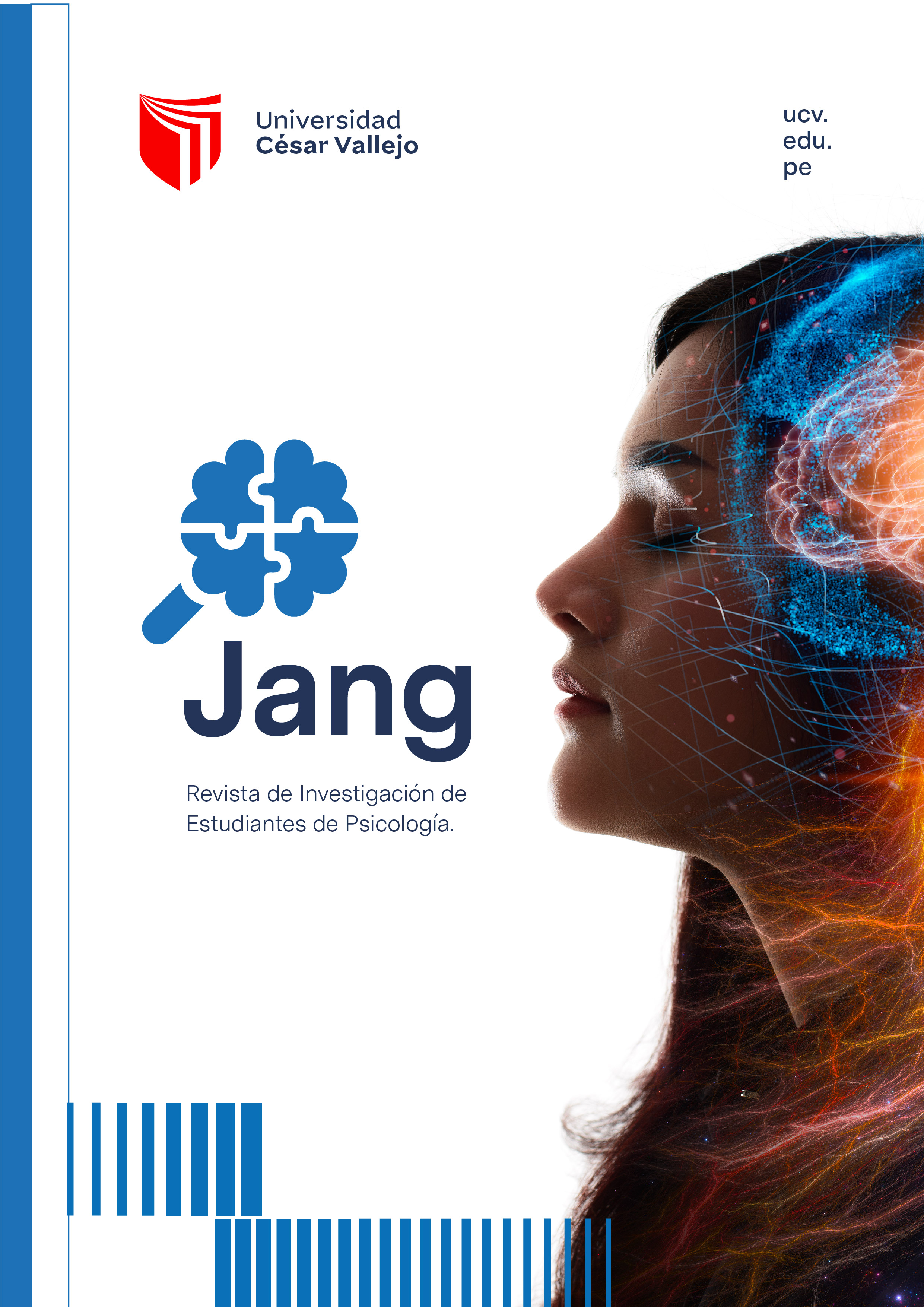Emotional dependency questionnaire in people with homosexual orientation: Psychometric evidence
DOI:
https://doi.org/10.18050/jang.1.1.2023.2Keywords:
Dependencia emocional, homosexuales, propiedades psicométricasAbstract
The purpose of this investigation was to find the psychometric properties of the Emotional Dependence Questionnaire (CDE), designed by Ventura and Caycho (original authors) in subjects with homosexual orientation in Peru. In the same way, it used a psychometric and technological methodology, the design was instrumental, with non-probabilistic sampling for convenience and a sample of 259 subjects with interest in affection towards others of the same sex, residing in the country in question for a period greater than 6 months. Likewise, a KMO of 0.937, a Bartlett test of 0.253, a distribution of six sets and a goodness-of-fit test of 0 were obtained, allowing the study to be carried out. Subsequently, in the analysis of the matrix of rotated factors, 5 factors were reached, each with a certain number of items: 6, 4, 3, 4 and 3, respectively. The correlation of the instrument and the attachment scale obtained a convergent validity through Spearman's coefficient of 0.424, moderate level. Between the dimensions and the test, he achieved a total of 0.741 and 1, a general Omega reliability of 0.90 and 3 percentile categories: low, average and high. Given this, it was concluded that the questionnaire of the variable under exploration in individuals with proximity to others of the same gender, showed an acceptable condition, being valid and reliable in Peru.
References
Aiken, L. R. (2003). Test psicológicos y evaluación. México. Pearson Educación.
American Psichological Association (2020). Orientación sexual e identidad de género. https://www.apa.org/centrodeapoyo/sexual
Arafat, Y., Rahman, H., Qusar, S. & Hafez, M. (2016). Cross-Cultural adaption and psychometric validation of research instruments: A methodological review. Bangladesh. Journal of Behavioral Health.5(3), 132-133. https://www.researchgate.net/publication/304454493_Cross_Cultural_Adaptation_and_Psychometric_Validation_of_Research_Instruments_a_Methodological_Review
Aragón, L. (2004). Fundamento Psicométricos en Evaluación Psicológica. Revista electrónica de Psicología Iztacala, 7 (4), 23-41. https://www.academia.edu/13385482/Fundamentos_Psicom%C3%A9tricos_en_la_Evaluaci%C3%B3n_Psicol%C3%B3gica
Ardila, R. (2008). Homosexualidad y Psicología. Editorial Manual moderno.
Bandura, A. (1984). Teoría del aprendizaje social. Madrid: Calpe.
Bowlby, J. (2003). Vínculos afectivos: formación, desarrollo y pérdida. Madrid: Morata.
Camarillo, L., Ferre, F., Echeburúa, E. & Amor, J. (2020). Partner´s Emotional Dependency Scale: Psychometrics. Actas Espanolas de psiquiatria, 2- 8. https://www.researchgate.net/publication/344246121
Castelló, J. (2005). Dependencia Emocional: Características y tratamiento. Alianza Editorial.
Colegio de Psicólogos del Perú. (2020). Código de ética profesional. Actualidad Psicológica.
García, F. (2006). La investigación tecnológica. Investigar, idear e innovar en Ingenierías y Ciencias Sociales. México: Editorial Limusa.
Hernández, R., Fernández, C. & Baptista, P. (2014). Roberto Hernández Sampieri metodología de la investigación [Archivo PDF]. http://observatorio.epacartagena.gov.co/wp-content/uploads/2017/08/metodologia-de-la-investigacion-sexta-edicion.compressed.pdf
Island, D. & Letellier, P. (1991). Men who beat the men who love them: battered gay men and domestic violence. (1).
Jiménez, J. & Sánchez, O. (2018). Propiedades Psicométricas de la Escala de Ideación Dependiente. Annals of psychology, 34(3), 465-471. https://revistas.um.es/analesps/article/download/analesps.34.3.318471/232 291/ 37
Lemos, M., Jaller, C., Gonzáles, A., Díaz, Z. & De la Ossa, D. (2011). Perfil cognitivo de la dependencia emocional en estudiantes universitarios en Medellín, Colombia. Universitas Psychologica. http://www.scielo.org.co/scielo.php?script=sci_arttext&pid=S1657-92672012000200004
Lemos, M. & Londoño, N. (2006). Construcción y validación del Cuestionario de dependencia emocional población colombiana. Acta Colombiana de Psicología. http://www.scielo.org.co/scielo.php?script=sci_arttext&pid=S0123-91552006000200012
López, M. & Ayala, D. (2011). Intimidad y las múltiples manifestaciones de la violencia doméstica entre mujeres lesbianas. Revista salud y sociedad, Antofagasta, 2(2), 151-174. https://www.redalyc.org/pdf/4397/439742466003.pdf
Martínez, R., Tuya, L., Martínez, M., Pérez, A. & Cánovas, A. (2009). El coeficiente de correlación de los rangos de spearman caracterización. Revista Habanera de Ciencias Médicas, 8(2). http://scielo.sld.cu/scielo.php?script=sci_arttext&pid=S1729-519X2009000200017
Otzen, T. & Monterola, C. (2017). Técnicas y muestreo sobre una población a estudio. Revista Int. J. Morphol, 35(1), 227-232. https://scielo.conicyt.cl/pdf/ijmorphol/v35n1/art37.pdf
Rodríguez, J., Momeñe, J., Estéves, A. e Iruarrizaga, I. (2019). Emotional dependence and conflict resolution in heterosexuals, homosexuals and bisexuals. Revista Española de drogodependencias. 44(1), 59-75. https://www.aesed.com/upload/files/v44n1_art4.pdf
Rodríguez, N. & Marinelli, F. (2017). Guía de Investigación en Psicología. Pontificia Universidad Católica del Perú, 11-75. https://cdn02.pucp.education/investigacion/2016/06/27144906/GUIA-DE-INVESTIGACION-PSICOLOGIA.pdf
Tamayo & Tamayo, M. (1997). El proceso de la investigación científica. Editorial Limusa.
Valero, S. (2013). Transformación e interpretación de las puntuaciones. UOC. https://materials.campus.uoc.edu/cdocent/PID_00283924/
Ventura, J. & Caycho, T. (2016). Análisis psicométrico de una escala de dependencia emocional en universitarios peruanos. Revista de psicología, Universidad de Chile. https://scielo.conicyt.cl/pdf/revpsicol/v25n1/art05.pdf
Ventura, J. & Caycho, T. (2017). El coeficiente Omega: un método alternativo para la estimación de la confiabilidad. Revista Latinoamericana de Ciencias Sociales, Niñez y Juventud, 15(1), 625-627. http://www.redalyc.org/articulo.oa?id=77349627039
Downloads
Published
How to Cite
Issue
Section
License
Copyright (c) 2023 Wendy Karolayn Pasache Chau

This work is licensed under a Creative Commons Attribution 4.0 International License.
Usted es libre de:
Compartir — copiar y redistribuir el material en cualquier medio o formato Adaptar — remezclar, transformar y construir a partir del material para cualquier propósito, incluso comercialmente.
La licenciante no puede revocar estas libertades en tanto usted siga los términos de la licencia
Bajo los siguientes términos:
Atribución — Usted debe dar crédito de manera adecuada, brindar un enlace a la licencia, e indicar si se han realizado cambios. Puede hacerlo en cualquier forma razonable, pero no de forma tal que sugiera que usted o su uso tienen el apoyo de la licenciante.
No hay restricciones adicionales — No puede aplicar términos legales ni medidas tecnológicas que restrinjan legalmente a otras a hacer cualquier uso permitido por la licencia.









